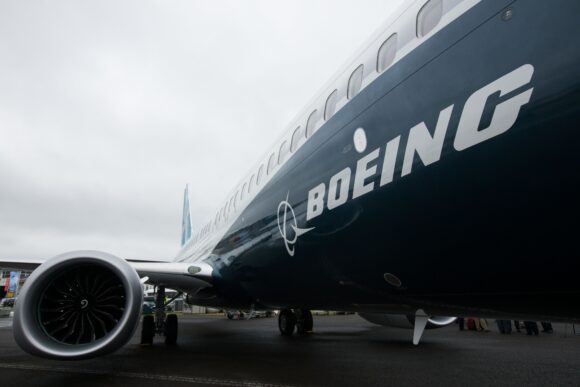Boeing Co.’s directors must face an investors’ lawsuit accusing them of failing to properly monitor safety issues and the development of 737 Max jetliners whose two fatal crashes have cost the company more than $20 billion.
Delaware Chancery Judge Morgan Zurn threw out some claims against Boeing’s board, but said Boeing shareholders produced enough evidence to justify pursuing claims that directors missed a “red flag” about the 737 Max’s safety issues in the first crash in October 2018. That incident raised issues about a flight-control system “that the board should have heeded but instead ignored,” the judge said in her 102-page decision.
Boeing’s board didn’t move to gain greater oversight over quality and safety until a second Max plunged into a field in Ethiopia in March 2019, according to a complaint filed by the New York State Common Retirement Fund and the Fire and Police Pension Association of Colorado. But the board failed to focus on safety even before the first crash, the investors claim.
The second disaster, which brought the death toll from the two accidents to 346, spurred a global grounding that plunged Boeing into one of the deepest crises in its century-long history. Investors’ suits against company directors have been consolidated in state court in Delaware.
“We are disappointed in the court’s decision to allow the plaintiffs’ case to proceed past this preliminary stage of litigation,” Boeing said in an email. “We will review the opinion closely over the coming days as we consider next steps.”
An automated flight-control system known as MCAS was implicated in both crashes, triggered by a single malfunctioning sensor. The U.S. Federal Aviation Administration cleared the Max aircraft to resume commercial flight last year after Boeing fixed the flawed design and made other extensive modifications to the Max jet’s flight-control computers.
Disgruntled investors claim Boeing CEO David Calhoun, who was lead director when the fatal accidents occurred, made “public representations” he knew were false about the board’s response to the first 737 Max crash in hopes of salvaging directors’ reputations. Zurn backed up their contentions, noting Calhoun made four misstatements after Lion Air Flight 610 plunged into the Java Sea in 2018, killing, all 189 people aboard.
Calhoun took over the top job at Boeing early last year, after Dennis Muilenburg was ousted for botching the company’s response to the crashes.
That disaster should have served as a wake up call to Boeing directors, Zurn said. Instead, board members “ignored the Lion Air Crash and the consequent revelations about the unsafe 737 MAX,” the judge wrote. Investors claim that led to the second fatal crash in 2019.
Zurn did throw out claims against individual Boeing executives, saying it was the board that failed to “make any good faith effort to implement and oversee a board-level system to monitor and report on safety.”
Zurn acknowledged the primary victims of Boeing’s lax oversight were the passengers of the two 737 Max flights and their families.
“While it may seem callous in the face of their losses, corporate law recognizes another set of victims: Boeing as an enterprise, and its stockholders,” the judge said. “The crashes caused the company and its investors to lose billions of dollars in value.”
The case is In Re Boeing Co. Derivative Litigation, 2019-0907, Delaware Chancery Court (Wilmington).
Was this article valuable?
Here are more articles you may enjoy.


 Tesla’s Austin Robotaxis Report 14 Crashes in First Eight Months
Tesla’s Austin Robotaxis Report 14 Crashes in First Eight Months  AI Claim Assistant Now Taking Auto Damage Claims Calls at Travelers
AI Claim Assistant Now Taking Auto Damage Claims Calls at Travelers  Bayer to Make $10.5 Billion Push to Settle Roundup Cases
Bayer to Make $10.5 Billion Push to Settle Roundup Cases  Asbestos Lawsuits Prompt Vanderbilt Minerals to File Bankruptcy
Asbestos Lawsuits Prompt Vanderbilt Minerals to File Bankruptcy 